Transcription for Digital Scholarship
Empowering Digital Scholarship & Classroom Pedagogy — Collaborative Transcription On An Intuitive Easy-To-Use Platform
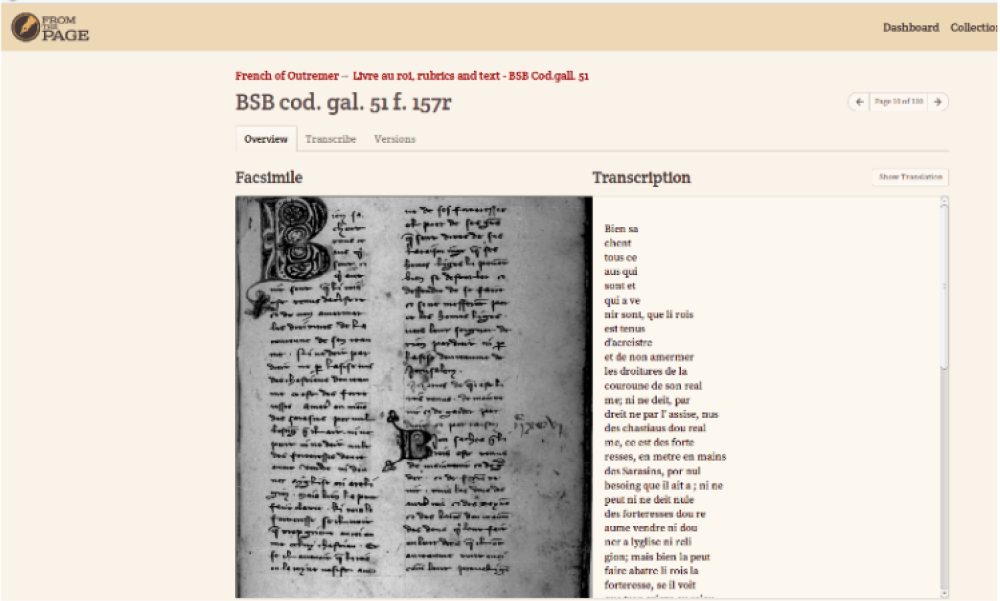
Empowering Digital Scholarship & Classroom Pedagogy — Collaborative Transcription On An Intuitive Easy-To-Use Platform

Engage researchers and students with a simple, customizable tool to create and proof high-quality transcriptions
Speak directly with the creators and learn how FromThePage can help you establish a digital space to transcribe primary source documents
Free customized walkthrough of the exact features that facilitate robust transcriptions for research, pedagogy, and creating ADA accessible materials
Like many archives at the university level, we are eager for students to use archival collections in an intellectually rigorous way. Students and alumni find that crowdsourcing transcription is fun and interesting, as well as academically substantive. Having the documents transcribed enables us to ask different questions and to automate larger-scale data exploration of the primary sources. FromThePage is such a feature-rich, easy-to-use platform that using it for archival records about early Chinese students has been a worthwhile, key phase of our larger project. We have been so fortunate to have FromThePage to keep people engaged with the archives remotely during the pandemic. It is a very intuitive platform for archives and volunteers.
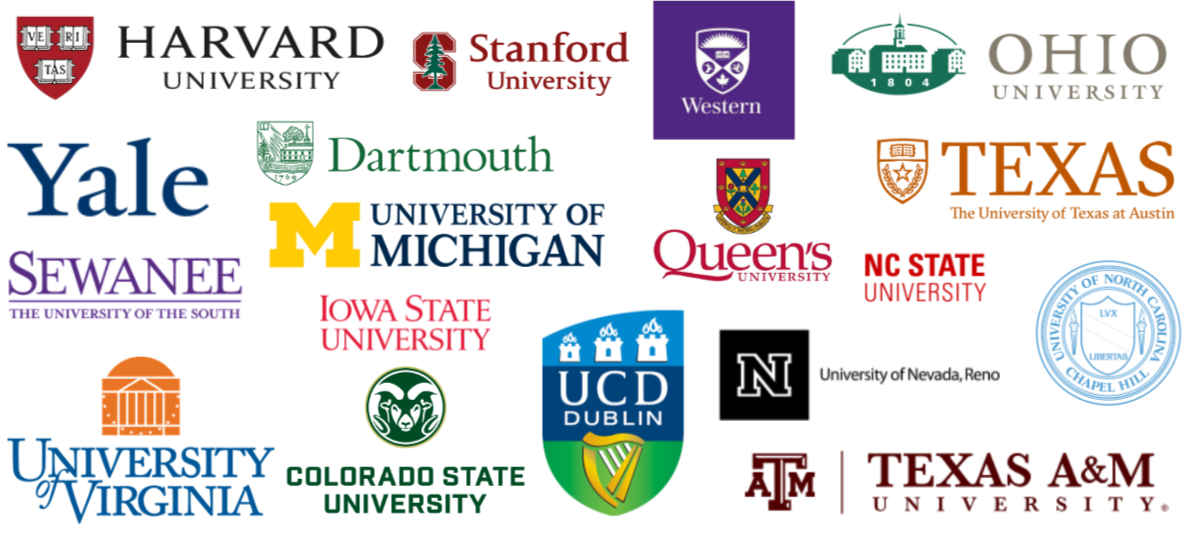
Incredibly useful in cultivating community engagement, developing research initiatives, and enhancing collection accessibility
With all of its features, FromThePage has proven to be incredibly useful for us in cultivating community engagement, developing research initiatives, and enhancing collection accessibility. This is primarily due to the customization the platform enables. On the one hand, project contributors have the ability to reconfigure with relative ease their workspace and workflows, such as using dictation to transcribe. On the project management side, the import and export features being designed and deployed as part of the NEH-funded work with UT Libraries will greatly facilitate the movement of collections between our institutional repositories and the platform to expedite access and preserve citizen scholarship.
My experience has been resoundingly positive. Since the very first day we uploaded our documents to the website, we’ve had volunteers from around the globe dive into the project. Additionally, using FromThePage provides a centralized place where I can send volunteers who are interested in transcribing, where I can answer questions quickly and easily, and where I can track progress on the project. Previously, I had been emailing chunks of records to people who were interested in transcribing, which was an extremely inefficient, difficult to track, and overly stressful method. Using FromThePage has streamlined my entire operation and greatly improved the quality and speed of our transcriptions.
We wanted to enrich our digitized collections, improving both the searchability and the accessibility of our records; a notoriously difficult thing for most archives to do, but here we have a way forward to address accessibility issues, and have full text available for screen readers. From an administrator's perspective, this had to be one of the easiest platforms to start up. It took all of 10-20 minutes to get our account and project started, and our transcriber managed to transcribe 20 pages before the end of the first day! Honestly, the barrier-to-entry is almost non-existent, volunteers significantly improve the accessibility of our holdings, and the rewards can be seen almost immediately.
Whether you want to export transcriptions for scholarly research or promote primary document literacy amongst the student body, we provide a platform to track, control, oversee, and review projects painlessly.
Always get your questions answered by us directly, the developers of the software. That way you get the support and help you need faster, with no extra steps.
There’s no reason to struggle through a complex set of tools that make no sense for your primary source materials. Streamlined, intuitive tools for your specific needs can be customized to make work easier for you and students or research collaborators.
We have experience advising many institutions how to use our wealth of tools for their specific materials, even if it’s a little out of the box. If you have a unique need, we are passionate about helping you meet it.
There are so many options… Facilitate a deep reading of primary sources with simply having students transcribe sources. Have students index people, places, and topics in the transcribed text, then write short articles about the indexed terms. Teach text encoding through marking up text using TEI tags in our advanced editor. Have students transcribe a page and then translate it. Explore texts with our integrations with Voyant or WordTrees, or export text to use other digital humanities tools.
With our custom demo of the software we show you how FromThePage can be configured to accomplish your specific goals with your actual materials. One way we do this is by sharing case studies of other users to show how our features can support your transcription needs in a variety of ways.
The following features are especially relevant and utilized by digital humanities faculty and librarians, researchers, and instructors:
Support your programming with an online component of public engagement of transcription and translation of primary source materials.
Collaborators can zoom to decipher difficult handwriting on uploaded documents.
Page level comments and discussion create a rich experience for transcribers to become more knowledgeable and precise over-time.
Tools to oversee, track, control, and review projects so you can maintain high-quality contributions.
Field-based transcription to support pre-printed forms allows transcription of structured data from index cards, government forms, spreadsheets, and questionnaires.
Standardized metadata fields can be created so that users can create item-level metadata.
Project owners can grant access to specific people only if they wish. This can restrict access to projects to only staff members, members of a research group, or members of indigenous or descendant communities.
Review of an OCR text compared to the original source document allows for human corrected transcriptions.
Users may tag subjects like toponyms or personal names, automatically creating an index in the text, preserving variant phrases or spellings used to refer to the same subject.
Import options to load collections and associated metadata as simply as entering URLs.
With cursive rarely being taught in schools, there may be a learning curve for students not exposed to documents from the 20th century or earlier. Consider providing a tutorial on the basics of the script and writing style of your materials. Also, working together to puzzle through a page of material as a class or pairing students up can be helpful. There is always the option to utilize historical typewritten sources as well.
We are happy to provide advice and resources to aid students in acquiring the skill to read unfamiliar scripts.
You can upload documents in small amounts over time; the work is all defined by your project goals and timeline. Other users can be promoted to reviewer, meaning your time doesn’t need to be monopolized by review of transcriptions. Keeping tabs on work is very easy as well; our nightly activity reports show you progress in your inbox every morning.
The extensive list of projects we’ve consulted on allows us to make suggestions to ensure you will be successful and our platform will not take excess time and effort on your part.
We can help. Evidence of successful past uses show this software will radically increase the usability of primary source documents enabling digital scholarship research initiatives and education with historic materials. This creates opportunities for enhancing collection accessibility for interoperability and supporting digital preservation.
We show examples of the variety of these outcomes in our case study highlights below.
We’ve worked in research computing for the humanities and social sciences, so we can advise on what helps make grant applications more compelling.
The information we can provide to reinforce your application includes similar case studies to show how FromThePage enables collaboration on digital humanities projects and how it’s benefited many others.
We go so far as to help with Letters of Support and Budget Line item breakdowns so including FromThePage in your grant applications is seamless.
After our custom demo call, if it doesn’t seem like a good fit, we can recommend different approaches, other collaborators, or other platforms if they’re more appropriate — we really don’t want you to use our software if it’s wrong for your needs.
We will support you however we can in charting your path to reach your goals.
We can share examples of other institutions with similar goals and their successful uses. This allows us to strategize with you on how best to tackle your particular materials and gives you an idea of the vast variety of projects we’ve supported.
It’s our mission to make it easier, more enjoyable, and more productive to expand your online offerings for digital scholarship support. We will help you set up your interface so you are ready to hit the ground running with your research group, for your digital humanities faculty, or with your students.
The robust flexibility of the platform coupled with the import/export options and the support of many different document types means integration is really simple.
If you have any questions along the way, we are available to answer them by email or chat. We can also set up a meeting to share our screen and walk through the platform functions with you.
You will never be left banging your head against your desk, we promise.
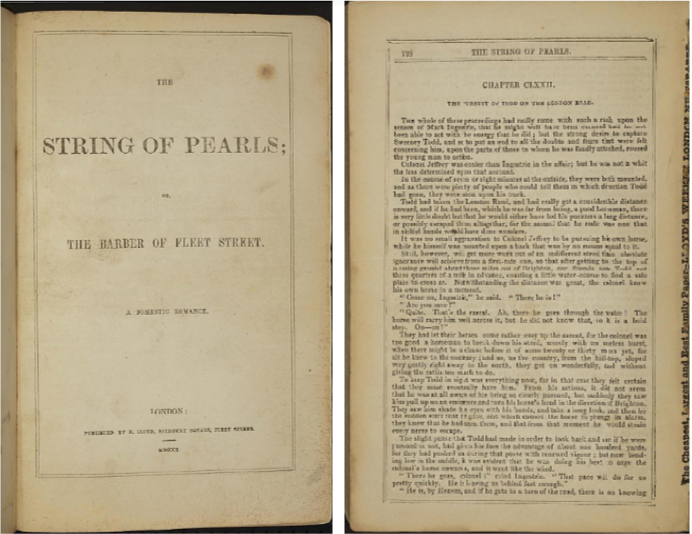
Rebecca Nesvet, an English Literature Professor at University of Wisconsin Green Bay uses FromThePage to teach documentary editing, critical editing, and how to create a Text Encoding Initiative (TEI) edition of The String of Pearls or The Barber of Fleet Street, the second oldest story of Sweeny Todd. FromThePage allows students to correct a poor OCR version, making a real contribution to the reading community. Explore Rebecca’s use of transcription for pedagogy here.
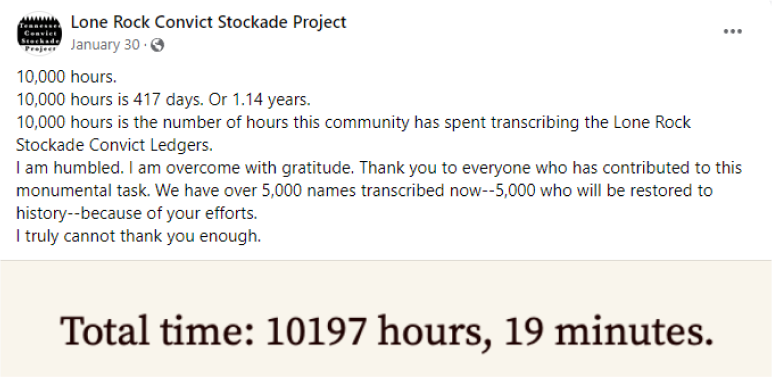
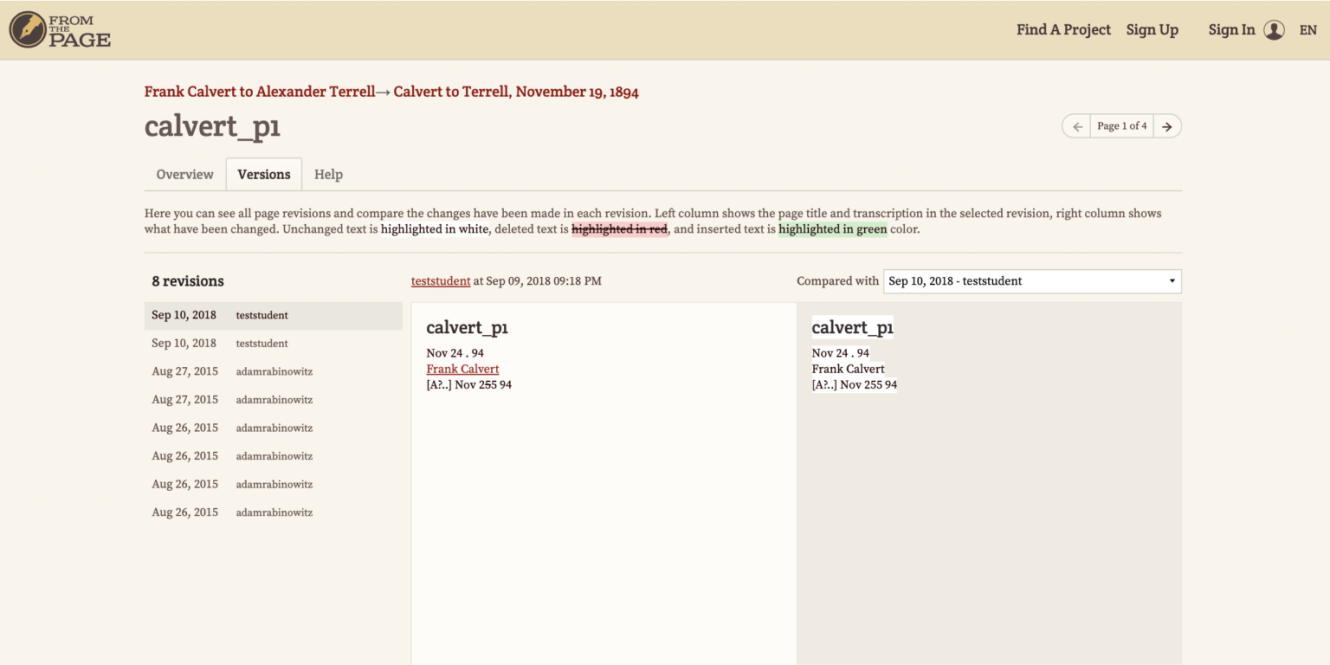
Adam Rabinowitz, a Classics Professor at the University of Texas at Austin, uses FromThePage as a teaching tool in an undergraduate course. Each student is assigned to find the primary source materials in the archive and transcribe a letter in the collection using FromThePage. Then a larger collection of transcribed letters are provided to write a paper. Read more on Adam’s use of transcription for pedagogy here.
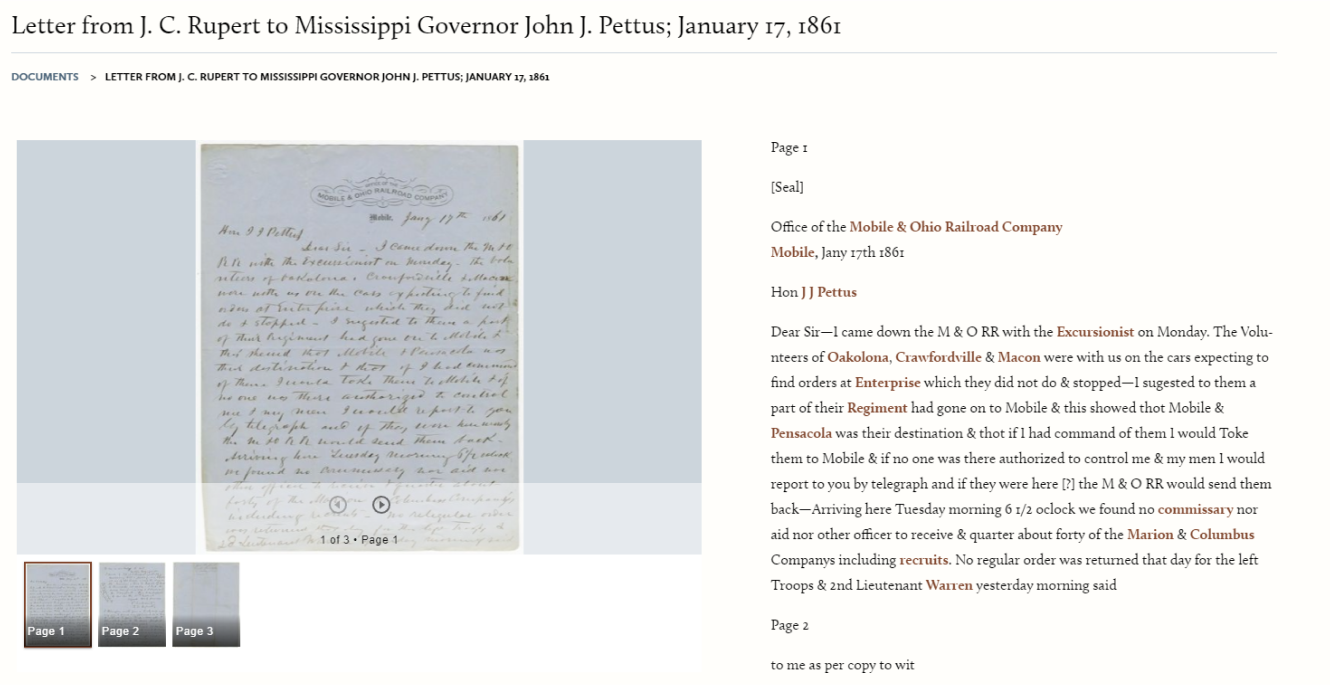
University of Southern Mississippi is transcribing, and annotating 20,000 digitized documents from the governor’s papers from the Civil War through the Reconstruction era. Transcription of letters to the governor provides a view of people experiencing this contentious time regardless of class, gender, race, religion, nativity, and age; traditional sources cannot provide access to that diversity. The collection includes lesson plans to help secondary educators incorporate these diverse nineteenth-century collections into classrooms. Discover more here.
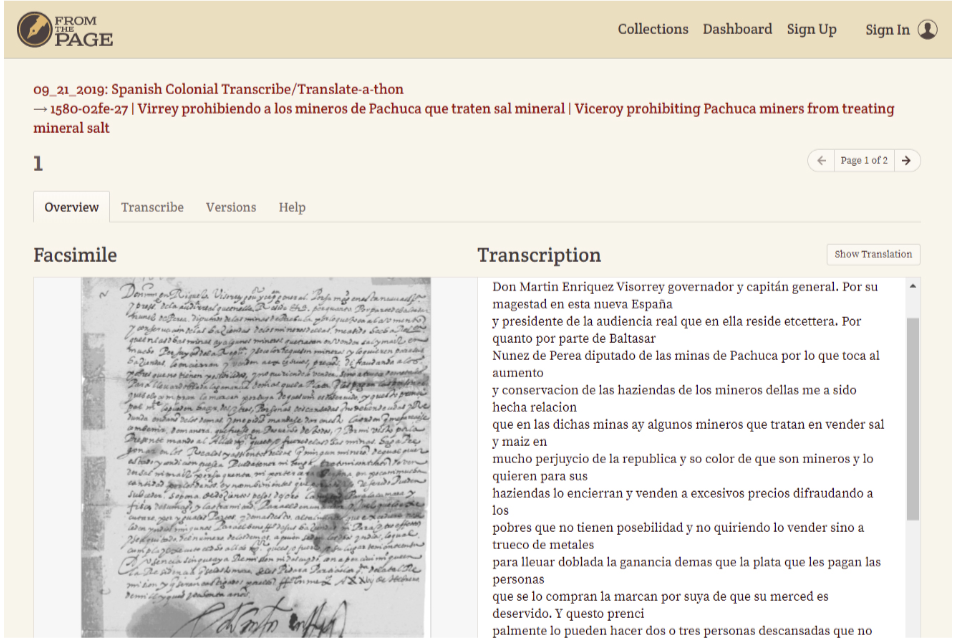
The University of Texas has a project focused on documenting underrepresented communities in Latin America through the digitization, digital preservation, and long-term digital access of fragile and endangered local archives. FromThePage partnered on internationalizing the platform, breaking down barriers to accessing Spanish and Portuguese-language digital collections, enabling collaboration with Latin American partners. Find out more about how FromThePage can support democratizing knowledge production here.
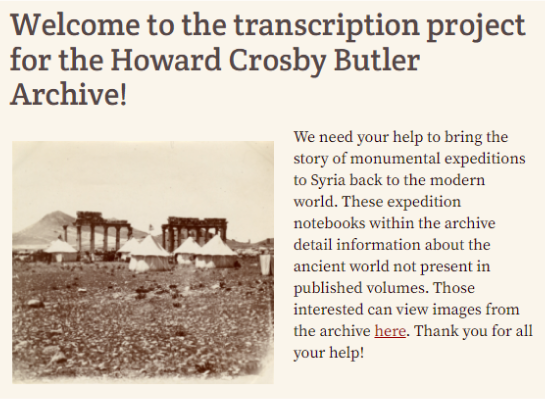
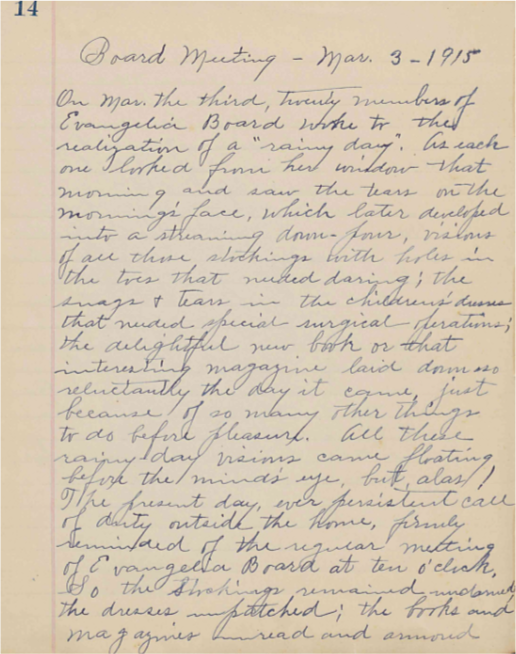
Dr. Julie deGraffenried & Benna Vaughan of Baylor University presented archival documents in a classroom setting to give students research experience in primary sources. Students used FromThePage to transcribe the 1916 minutes of the Evangelia Settlement House, the first daycare program for underprivileged children in Waco, Texas. Students experienced first-hand how transcription is a public service history enthusiasts can perform for the public. See how impactful the experience was for students here.
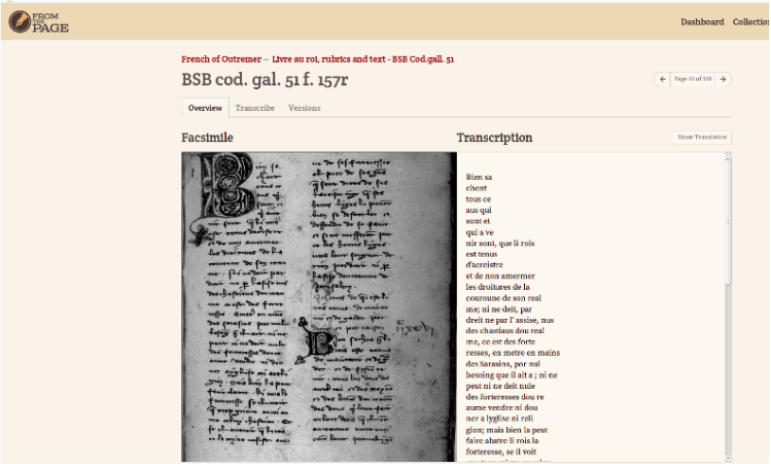
I have used FromThePage as both a research and a pedagogical tool; not having to wrestle with the tool is so helpful in keeping up the momentum of the work. I can confidently ask my colleagues to collaborate without asking them to spend hours learning a new tool or interface. A four year remote collaboration project has endured to a great extent because we could bring project members in seamlessly. In the classroom, my students have found transcribing exciting and gratifying, and a wonderful addition to the secondary material we are learning. Students really like learning this way because it is an unmediated experience; this is a real experience of meeting a scribe through his or her writings.
We have an enormous amount of understudied documentation that could yield meaningful findings, if people could just get to the stuff — FromThePage helps make access possible.
The platform is straightforward; not having to learn a bunch of code or a complicated platform is such a relief. I had one student say it was “soothing” to work on transcribing on FromThePage, and that made me so happy. I don’t want it to be tedious and boring work, because the subject is so interesting! FromThePage lets the subject be the focus, and makes it easy to work. I lose track of time a lot when I work on the project and don’t want to stop.
As part of a land grant institution, the library wholeheartedly supports the mission of sharing knowledge beyond the campus borders. Adhering to this mission requires a further commitment to digital accessibility and the inclusive practice of removing barriers that prevent interaction with, or access to, digital content by people with disabilities. By providing accurate transcriptions, translations, and correcting OCR, we expand access to this content for all online users in accordance with WCAG 2.1 AA accessibility guidelines. Ben and Sara are easy to work with, understand our profession well, and are committed to making the systems we all use easier and better integrated.
Pages — and counting!
With FromThePage you get powerful transcription, annotation, metadata, and indexing capabilities to create searchable documents to expand the community that can access them.
Whether you plan to crowdsource transcription projects within your classroom or use the platform to create a remote digital humanities research team, we can advise on what features have helped our many successful clients set up their systems for efficiency and ease of use.
If we don’t currently have the functionality you need, we will develop the solution collaboratively with you, or we will suggest alternate collaborators or platforms to help you reach your goals.
That’s what you get when you have developers that are fully invested in your success.
With FromThePage everyone from secondary and college students to retiree volunteers can hop online and transcribe a document. Template instructions appear with every item — basic transcription protocols and best practices that project directors can tweak to their standards. FromThePage lets us annotate documents from the start, radically improving users ability to navigate and learn from the collection as soon as it is available online.